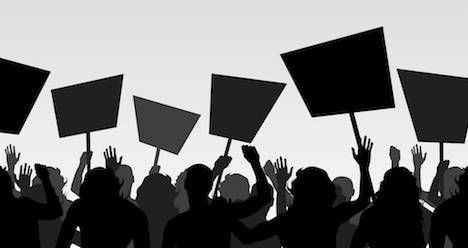
100 Must Read Books About Revolutions, Rebellions, and Uprisings
There is an undeniable revolutionary vibe in the air these days. The books about revolutions that tell the stories of people who fight against oppression in many different forms. Some of these stories are based on real rebellions in real places. Others take place in locations that we can only imagine under circumstances that seem simultaneously far-fetched and a little too likely. All of these books about revolutions and uprisings can serve both as a source of inspiration and as a warning of things that are yet to come.
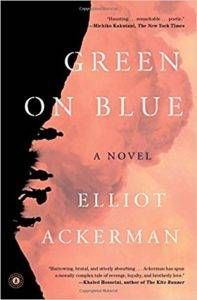
Aziz and his older brother Ali are coming of age in a village amid the pine forests and endless mountains of eastern Afghanistan.
Children of the New World by Assia Djebar
Djebar focuses on the experiences of women drawn into the politics of resistance.
The Blue Line by Ingrid Betancourt
It is a story centered on the consequences of oppression, collective subservience, and individual courage, and, most of all, the notion that belief in the future of humanity is an act of faith most beautiful and deserving.
Heaven of Drums by Ana Gloria Moya
This story of love and revolution takes place during the Argentine struggle for independence (1810–1820) and focuses on the character of the national hero, Manuel Belgrano.
The Swan Book by Alexis Wright
When Warren Finch, the first Aboriginal president of Australia, invades the swamp with his charismatic persona and the promise of salvation, Oblivia agrees to marry him, becoming First Lady, a role that has her confined to a tower in a flooded and lawless southern city.
The Seamstress by Frances de Pontes Peebles
As seamstresses, the young sisters Emília and Luzia dos Santos know how to cut, mend, and conceal—useful skills in the lawless backcountry of Brazil, where ruthless land barons feud with bands of outlaw cangaceiros, trapping innocent residents in the crossfire.
Uprising by Douglas Bland
When impoverished, disheartened, poorly educated, but well-armed aboriginal young people find a modern revolutionary leader, they rally with a battle cry of “Take Back the Land!” Theirs is a fight to right the wrongs inflicted on them by “the white settlers.”
Allende by Fernando Alegria
Although everything in this imaginative and compelling biography of the martyred Chilean President Salvador Allende (1908–1973) is solidly based on fact, it is cast in the form of a novel.
Sandalwood Death by Mo Yan
Sandalwood Death is set during the Boxer Rebellion (1898–1901)—an anti-imperialist struggle waged by North China’s farmers and craftsmen in opposition to Western influence.
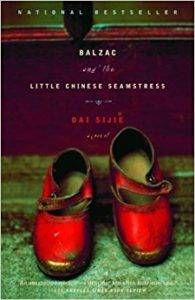
This book tells the story of two hapless city boys exiled to a remote mountain village for re-education during China’s infamous Cultural Revolution.
Ocean of Words by Ha Jin
The place is the chilly border between Russia and China. The time is the early 1970s, when the two giants were poised on the brink of war. And the characters in this thrilling collection of stories are Chinese soldiers who must constantly scrutinize the enemy.
Serve the People! by Yan Lianke
Set in 1967, at the peak of the Mao cult, Serve the People! is a beautifully told, wickedly daring story about the forbidden love affair between Liu Lian, the young, pretty wife of a powerful Division Commander in Communist China, and her household’s lowly servant, Wu Dawang.
A Dictionary of Maqiao by Han Shaogong
Told in the format of a dictionary, with a series of vignettes disguised as entries, A Dictionary of Maqiao is a novel of bold invention—and a fascinating, comic, deeply moving journey through the dark heart of the Cultural Revolution.
Half of Man is Woman by Zianlang Zhang
As the Cultural Revolution rages, Zhang falls in love with a peasant woman jailed for promiscuity. After becoming separated for years, they unite, but Zhang has been made impotent, half a man, which eventually destroys their relationship.
The General in his Labyrinth by Gabriel Garcia Marquez
General Simon Bolivar, one of the Western Hemisphere’s supreme heroes, embarks on a seven month voyage down the Magdalena River.
I, Che Guevara by John Blackthorn
When a strange man appears in rural towns around Cuba quietly advocating a new kind of politics he calls “the True Republic,” old-timers begin to suspect that the elderly stranger, who calls himself Ernesto Blanco, may actually be the martyr Ernesto “Che” Guevara.
Yocandra in the Paradise of Nada by Zoe Valdes
The bold, bawdy story of a failed revolution and its discontents.
Cuba Libre by Elmore Leonard
Leonard spins a gloriously exciting yarn about an American horse wrangler who escapes a date with a Cuban firing squad to join forces with a powerful sugar baron’s lady looking to make waves and score big in and around Spanish-American War-torn Havana in 1898.
The Red Umbrella by Christina Diaz Gonzalez
In 1961, two years after the Communist revolution, Lucía Álvarez still leads a carefree life, dreaming of parties and her first crush. But when the soldiers come to her sleepy Cuban town, everything begins to change.
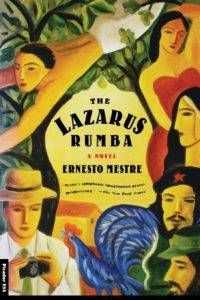
This extraordinary ambitious novel sets out to portray the spiritual landscape of the Cuban people in the wake of Castro’s revolutionary upheaval.
Waiting for Snow in Havana by Carlos Eire
This novel is both an exorcism and an ode to a paradise lost. For the Cuba of Carlos’s youth—with its lizards and turquoise seas and sun-drenched siestas—becomes an island of condemnation once a cigar-smoking guerrilla named Fidel Castro ousts President Batista on January 1, 1959.
A Hand Full of Stars by Rafik Schami
Amid the turmoil of modern Damascus, one teenage boy finds his political voice in a message of rebellion that echoes throughout Syria and as far away as Western Europe.
Book of Sands by Karim Alrawi
This powerful, lyrical novel of the endurance of love is set amid the upheaval of the Arab Spring and the brutal repression of a totalitarian regime.
City of Love and Ashes by Yusuf Idris
Cairo, January 1952. Egypt is at a critical point in its modern history, struggling to throw off the yoke of the seventy year British occupation and its corrupt royalist allies.
Revolution Baby by Joanna Gruda
Julek has assumed countless different identities, lived with numerous families, and worked as a secret agent for the Resistance. And he’s just 14.
The Queue by Basma Abdel Aziz
In a surreal, but familiar, vision of modern day Egypt, a centralized authority known as ‘the Gate’ has risen to power in the aftermath of the ‘Disgraceful Events,’ a failed popular uprising.
Nostromo by Joseph Conrad
One of the greatest political novels in any language, Nostromo reenacts the establishment of modern capitalism in a remote South American province locked between the Andes and the Pacific.
The Handmaid’s Tale by Margaret Atwood
Offred is a Handmaid in the Republic of Gilead. She must lie on her back once a month and pray that the Commander makes her pregnant, because in an age of declining births, Offred and the other Handmaids are valued only if their ovaries are viable.
The Giver by Lois Lowry
The haunting story centers on twelve-year-old Jonas, who lives in a seemingly ideal, if colorless, world of conformity and contentment. Not until he is given his life assignment as the Receiver of Memory does he begin to understand the dark, complex secrets behind his fragile community.
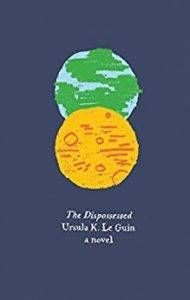
Shevek, a brilliant physicist, decides to take action. He will seek answers, question the unquestionable, and attempt to tear down the walls of hatred that have isolated his planet of anarchists from the rest of the civilized universe.
The Last Colony by John Scalzi
Retired from his fighting days, John Perry is now village ombudsman for a human colony on distant Huckleberry. With his wife, former Special Forces warrior Jane Sagan, he farms several acres, adjudicates local disputes, and enjoys watching his adopted daughter grow up. Circumstances are about to change.
Red Mars by Kim Stanley Robinson
For centuries, the barren, desolate landscape of the red planet has beckoned to humankind. Now a group of one hundred colonists begins a mission whose ultimate goal is to transform Mars into a more Earthlike planet.
Animal Farm by George Orwell
A farm is taken over by its overworked, mistreated animals. With flaming idealism and stirring slogans, they set out to create a paradise of progress, justice, and equality.
The Moon is a Harsh Mistress by Robert Heinlein
It is a tale of revolution, of the rebellion of the former Lunar penal colony against the Lunar Authority that controls it from Earth. It is the tale of the disparate people—a computer technician, a vigorous young female agitator, and an elderly academic—who become the rebel movement’s leaders.
Dune by Frank Herbert
Set on the desert planet Arrakis, Dune is the story of the boy Paul Atreides, who would become the mysterious man known as Muad’Dib. He would avenge the traitorous plot against his noble family—and would bring to fruition humankind’s most ancient and unattainable dream.
The Rebellion’s Last Traitor by Nik Korpon
Memory is a commodity—bought and sold, and experienced like a drug. Henraek works as a Tathadann memory thief, draining citizens’ memories. Everything changes when Henraek harvests a memory of his own wife’s death, in the hidden rebellion that once tore apart their city.
The House of Spirits by Isabel Allende
The House of the Spirits brings to life the triumphs and tragedies of three generations of the Trueba family. The granddaughter, Alba, will lead her family and her country into a revolutionary future.
Otared by Mohammad Rabie
2025: fourteen years after the failed revolution, Egypt is invaded once more. As traumatized Egyptians eke out a feral existence in Cairo’s dusty downtown, former cop Ahmed Otared joins a group of fellow officers seeking Egypt’s liberation through the barrel of a gun.
Brave New World by Aldous Huxley
Brave New World is a searching vision of an unequal, technologically-advanced future where humans are genetically bred, socially indoctrinated, and pharmaceutically anesthetized to passively uphold an authoritarian ruling order—all at the cost of our freedom, full humanity, and perhaps also our souls.
The Book of Lamentations by Rosario Castellanos
Set in the highlands of the Mexican state of Chiapas, this book tells of a fictionalized Mayan uprising that resembles many of the rebellions that have taken place since the indigenous people of the area were first conquered by European invaders five hundred years ago.
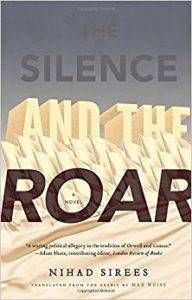
The Silence and the Roar follows a day in the life of Fathi Sheen, an author banned from publishing because he refuses to write propaganda for the ruling government.
Guapa by Saleem Haddad
Set over the course of twenty-four hours, Guapa follows Rasa, a gay man living in an unnamed Arab country, as he tries to carve out a life for himself in the midst of political and social upheaval.
Alif the Unseen by G. Willow Wilson
In an unnamed Middle Eastern security state, a young Arab-Indian hacker shield his clients, dissidents, outlaws, Islamists, and other watched groups from surveillance and tries to stay out of trouble.
American War by Omar El Akkad
A second American Civil War, a devastating plague, and one family caught deep in the middle—a story that asks what might happen if America were to turn its most devastating policies and deadly weapons upon itself.
Farhenheit 451 by Ray Bradbury
Guy Montag is a fireman. In his world, where television rules and literature is on the brink of extinction, firemen start fires rather than put them out. His job is to destroy the most illegal of commodities, the printed book, along with the houses in which they are hidden.
The Cloud Sketcher by Richard Rayner
In a tiny village in Finland, Esko Vaananen is at the brink of despair—he loves a woman he can never have. In the magical light of the aurora borealis, he has a vision of an impossibly tall building rising gracefully from the frozen lake and disappearing into the clouds above him. He will spend the rest of his life protecting these two passions.
A Place of Greater Safety by Hilary Mantel
It is 1789, and three young provincials have come to Paris to make their way. In the swells of revolution, they each taste the addictive delights of power, and the price that must be paid for it.
The Scarlet Pimpernel by Baronness Orczy
The year is 1792. The French Revolution, driven to excess by its own triumph, has turned into a reign of terror. Daily, tumbrels bearing new victims to the guillotine roll over the cobbled streets of Paris…Thus the stage is set for one of the most enthralling novels of historical adventure ever written.

After 18 years as a political prisoner in the Bastille, the aging Doctor Manette is finally released and reunited with his daughter in England. There the lives of two very different men, Charles Darnay, an exiled French aristocrat, and Sydney Carton, a disreputable but brilliant English lawyer, become enmeshed through their love for Lucie Manette.
The Gods Are Athirst by Anatole France
Young artist Évariste Gamelin is the right-hand man of Jacobin, Marat, and Robespierre, and eventually becomes appointed as a juror on the Revolutionary Tribunal during the heinous Reign of Terror.
Ninety-Three by Victor Hugo
Published in 1874, shortly after the bloody upheaval of the Paris Commune, the novel concerns the Revolt in the Vendée and Chouannerie—the counter-revolutionary revolts in 1793 during the French Revolution.
The Kingdom of This World by Alejandro Carpentier
A few years after its liberation from the brutality of French colonial rule in 1803, Haiti endured a period of even greater brutality under the reign of King Henri-Christophe, who was born a slave in Grenada but rose to become the first black king in the Western Hemisphere.
All Souls’ Rising by Madison Smartt Bell
The slave uprising in Haiti was a momentous contribution to the tide of revolution that swept over the Western world at the end of the 1700s. A brutal rebellion that strove to overturn a vicious system of slavery, the uprising successfully transformed Haiti from a European colony to the world’s first Black republic.
Train to Pakistan by Khushwant Singh
Train to Pakistan is the story of this isolated village that is plunged into the abyss of religious hate. It is also the story of a Sikh boy and a Muslim girl whose love endures and transcends the ravages of war.
Midnight’s Children by Salman Rushdie
Saleem Sinai is born at the stroke of midnight on August 15, 1947, the very moment of India’s independence. Greeted by fireworks displays, cheering crowds, and Prime Minister Nehru himself, Saleem grows up to learn the ominous consequences of this coincidence.
Shadow Lines by Amitav Ghosh
The narrator, Indian born and English educated, traces events back and forth in time, from the outbreak of World War II to the late twentieth century, through years of Bengali partition and violence, observing the ways in which political events invade private lives.
A Flight of Pigeons by Ruskin Bond
This is the story of the Labadoor family, set in 1857. The patriarch of the family is killed in a church, and Ruth Labadoor and her family have to take the help of Hindus and Muslims to find their way to their relatives.
The Great Indian Novel by Shashi Tharoor
The Great Indian Novel takes its title not from the auther’s estimate of its contents but in deference to its primary source of inspiration, the ancient epic the Mahabharata.
The Siege of Krishnapur by J.G. Farrell
India, 1857—the year of the Great Mutiny, when Muslim soldiers turned in bloody rebellion on their British overlords.
Robot Uprisings edited by Daniel H. Wilson and John Joseph Adams
Humans beware. As the robotic revolution continues to creep into our lives, it brings with it an impending sense of doom. What horrifying scenarios might unfold if our technology were to go awry?
Sisters of the Revolution edited by Ann and Jeff Vandermeer
Including stories from the 1970s to the present day, the collection seeks to expand the conversation about feminism while engaging the reader in a wealth of imaginative ideas. Moving from the fantastic to the futuristic, subtle to surreal, these stories will provoke thoughts and emotions about feminism like no other book available today.
The House of the Mosque by Kader Abdolah
The House of the Mosque primarily explores the lifestyle of a traditional, extended Iranian family and how they coped with the changes brought by the Westernization of Iran until 1979, the revolution, and the subsequent radicalization.
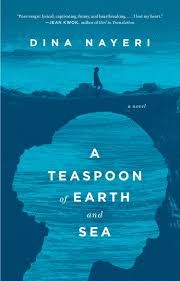
Growing up in a small rice-farming village in 1980s Iran, eleven-year-old Saba Hafezi and her twin sister Mahtab are captivated by America. When her mother and sister disappear, leaving Saba and her father alone in Iran, Saba is certain that they have moved to America without her. As she struggles with the limited possibilities in post-revolutionary Iran, Saba envisions that there is another way for her story to unfold.
The Septembers of Shiraz by Dalia Sofer
In the aftermath of the Iranian revolution, rare-gem dealer Isaac Amin is arrested, wrongly accused of being a spy.
Whirlwind: A Novel of the Iranian Revolution by James Clavell
Whirlwind is the story of three weeks in Tehran in February 1979: three weeks of fanaticism, passion, self-sacrifice and heartbreak. Caught between the revolutionaries and the forces of international intrigue is a team of professional pilots. They are ordered to flee to safety with their helicopters. Two of them, both Europeans, have Iranian wives whom they love beyond safety and politics.
The Soldier’s Song by Alan Monaghan
Set during World War I, the novel follows the fortunes of Stephen Ryan, a gifted young maths scholar, as he enlists in the British army and leaves his native Ireland to fight in Europe. He finds his loyalties tested, however, when he returns from the front in 1916 to find Ireland in the midst of an uprising.
Fools of Fortune by William Trevor
An informer’s body is found on the estate of a wealthy Irish family shortly after the First World War, and an appalling cycle of revenge is set in motion. Led by a zealous sergeant, the Black and Tans set fire to the family home, and only young Willie and his mother escape alive.
The House of Splendid Isolation by Edna O’Brien
A novel that looks into the mind and heart of contemporary Ireland as an escaped IRA operative takes refuge in an abandoned house—until the occupant unexpectedly returns home.
A Star Called Henry by Roddy Doyle
From his own birth and childhood on the streets of Dublin to his role as soldier (and lover) in the Irish Rebellion, Henry recounts his early years of reckless heroism and adventure.
The Leopard by Giuseppe Di Lampedusa
Set in the 1860s, The Leopard tells the spellbinding story of a decadent, dying Sicilian aristocracy threatened by the approaching forces of democracy and revolution.
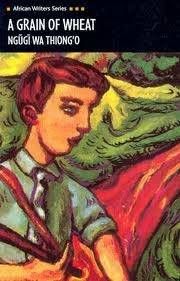
Set in the wake of the Mau Mau rebellion and on the cusp of Kenya’s independence from Britain, A Grain of Wheat follows a group of villagers whose lives have been transformed by the 1952–1960 Emergency.
The Centurions by Jean Lareteguy
As relevant today as it was half a century ago, The Centurions is a gripping military adventure, an extended symposium on waging war in a new global order, and an essential investigation of the ethics of counterinsurgency.
The Underdogs by Mario Azuela
Demetrio Macias, a poor, illiterate Indian, must join the rebels to save his family. Courageous and charismatic, he earns a generalship in Pancho Villa’s army, only to become discouraged with the cause after it becomes hopelessly factionalized.
Old Gringo by Carlos Fuentes
The Old Gringo tells the story of Ambrose Bierce, the American writer, soldier, and journalist, and of his last mysterious days in Mexico living among Pancho Villa’s soldiers, particularly his encounter with General Tomas Arroyo.
Cartucho and My Mother’s Hands by Nellie Campobello
Cartucho and My Mother’s Hands are autobiographical evocations of a childhood spent amidst the violence and turmoil of the Revolution in Mexico.
The Eagle and the Serpent by Martin Luis Guzman
The first person protagonist is the author himself, then a young man who had left the University of Mexico to join the revolutionary forces. With the overthrow of the dictator, de la Huerta, and the ensuing power struggle, Guzman was faced with a choice of leaders. Through firsthand associations with Carranza, the “First Chief,” and with Pancho Villa, he found that both of these men were military-minded adventurers, totally untrained and inept as politicians.
The Guillotine Squad by Guillermo Ariaga
Feliciano Velasco y Borbolla de la Fuente, a lawyer, sells his famous invention, the guillotine, to Pancho Villa, the renowned insurgent general of the Mexican Revolution. Soon Feliciano finds himself immersed in the logic of this simultaneously bizarre, heroic, and cruel world of Villa’s troops.
The Edge of the Storm by Agustin Yanez
This tale of a repressive priest and his small Mexican village during the eighteen months preceding the Revolution of 1910 is a great novel, one that exposes the struggle between human desire and paralyzing fear—fear of humanity, fear of nature, fear of the wrath of God.
Not of War Only: A Novel of the Mexican Revolution by Nathan Zollinger
Not of War Only is the roaring tale of two Americans caught in the tragedies and triumphs of the Mexican Revolution in 1914, and of the women who fight beside them and love them.
A Shattering of Silence by Farida Karodia
Eight-year-old Faith’s life is shattered when she witnesses a massacre in her village in rural Mozambique. She escapes, but loses everything—her parents, her home, her identity and her voice. This is Faith’s quest to find a place for herself in war-torn Mozambique, where she is caught between the white colonials and the local resistance.
With Fire and Sword by Henryk Sienkiewicz
Having already achieved success in his career around the end of the 19th century, the Polish journalist negatively portrayed the Teutonic Order at a time in which his audience lived under German rule.
Spartacus by Lewis Grassic Gibbon
Heralded as one of the great historical novels of the twentieth century—and an inspiration to generations of people who have fought against oppression and exploitation—Spartacus is a masterpiece of vivid storytelling from one of Scotland’s finest writers.
Doctor Zhivago by Boris Pasternack
Doctor Zhivago is the story of the life and loves of a poet/physician during the turmoil of the Russian Revolution. Taking his family from Moscow to what he hopes will be shelter in the Ural Mountains, Zhivago finds himself instead embroiled in the battle between the Whites and the Reds.
The White Guard by Mikhail Bulgakov
It is 1918: the Russian Revolution has just ended, Ukraine is in the midst of civil war, and in Kiev, the two Turbin brothers are preparing to fight for the White Guard in the wake of their beloved mother’s death.

In February of 1917 Russia was a backwards, autocratic monarchy, mired in an unpopular war; by October, after not one but two revolutions, it had become the world’s first workers’ state, straining to be at the vanguard of global revolution. How did this unimaginable transformation take place?
Darkness at Noon by Arthur Koestler
During Stalin’s purges, Nicholas Rubashov, an aging revolutionary, is imprisoned and psychologically tortured by the party he has devoted his life to. Under mounting pressure to confess to crimes he did not commit, Rubashov relives a career that embodies the ironies and betrayals of a revolutionary dictatorship that believes it is an instrument of liberation.
The Case of Comrade Tulayev by Victor Serge
One cold Moscow night, Comrade Tulayev, a high government official, is shot dead on the street, and the search for the killer begins. In this panoramic vision of the Soviet Great Terror, the investigation leads all over the world, netting a whole series of suspects whose only connection is their innocence—at least of the crime of which they stand accused.
The Cellist of Sarajevo by Steven Galloway
In a city under siege, four people whose lives have been upended are ultimately reminded of what it is to be human. From his window, a musician sees twenty-two of his friends and neighbors waiting in a breadline. Then, in a flash, they are killed by a mortar attack. In an act of defiance, the man picks up his cello and decides to play at the site of the shelling for twenty-two days, honoring their memory.
Burger’s Daughter by Nadine Gordimer
This is the moving story of the unforgettable Rosa Burger, a young woman from South Africa cast in the mold of a revolutionary tradition. Rosa tries to uphold her heritage handed on by martyred parents while still carving out a sense of self.
The Curious Tale of Mandogi’s Ghost by Sok-pom Kim
Mandogi becomes unwittingly involved in the Four-Three Incident of 1948, in which the South Korean government brutally suppressed an armed peasant uprising and purged Cheju-do of communist sympathizers. Although Mandogi is sentenced to death for his part in the riot, he survives (in a sense) to take revenge on his enemies and fully commit himself to the resistance.
No Knives in the Kitchens of this City by Khaled Khalifa
Set between the 1960s and 2000s, No Knives in the Kitchens of this City unravels the systems of fear and control under Assad. With eloquence and startling honesty, it speaks of the persecution of a whole society.
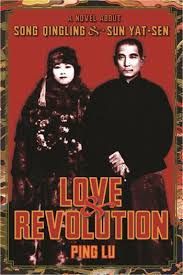
In this bold novel, one of Taiwan’s most celebrated authors reimagines the lives of a legendary couple: Sun Yat-sen, known as the “Father of the Chinese Revolution,” and his wife, Song Qingling.
The Hornet’s Nest by Jimmy Carter
Jimmy Carter brings to life the Revolutionary War as it was fought in the Deep South; it is a saga that will change the way we think about the conflict. He reminds us that much of the fight for independence took place in that region and that it was a struggle of both great and small battles and of terrible brutality, with neighbor turned against neighbor, and no quarter asked or given.
The Hamilton Affair by Elizabeth Cobb
Set against the dramatic backdrop of the American Revolution, and featuring a cast of legendary characters, The Hamilton Affair tells the sweeping, tumultuous, true story of Alexander Hamilton and Elizabeth Schuyler, from passionate and tender beginnings to his fateful duel on the banks of the Hudson River.
The Confessions of Nat Turner by William Styron
In the late summer of 1831, in a remote section of southeastern Virginia, there took place the only effective, sustained revolt in the annals of American Negro slavery. The revolt was led by a remarkable Negro preacher named Nat Turner, an educated slave who felt himself divinely ordained to annihilate all the white people in the region.
Amistad by David Pesci
Amistad is the powerfully re-imagined history of one of the country’s first battles for civil rights. In 1839, fifty-three enslaved Africans, led by a Mende rice farmer named Singbe-Pieh, staged a bloody rebellion on board the Amistad, a Spanish slaver from Cuba.
The Orenda by Joseph Boyden
The Huron have battled the Iroquois for generations, but now both tribes face a new, more dangerous threat from another land. Uneasy alliances are made and unmade, cultures and beliefs clash in the face of precipitous change, and not everyone will survive the march of history.
Tree of Red Stars by Tessa Bridal
This novel, set in Uruguay in the 1960s, charts the toll of political events on a young woman and those close to her, as their democracy is gradually taken over by a military dictatorship.
The Sympathizer by Viet Thanh Nguyen
The Sympathizer is a sweeping epic of love and betrayal. The narrator, a communist double agent, is a “man of two minds,” a half-French, half-Vietnamese army captain who arranges to come to America after the Fall of Saigon, and while building a new life with other Vietnamese refugees in Los Angeles is secretly reporting back to his communist superiors in Vietnam.
Harvest of Thorns by Shimm Chinodya
The revolution that ended white minority rule in Rhodesia (now Zimbabwe) is seen here chiefly through the eyes of Benjamin Tichafa, a young guerrilla.
What are your favorite books about revolutions?







